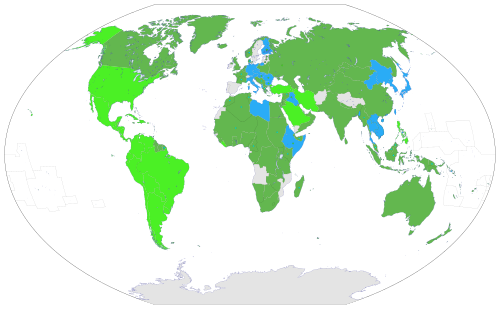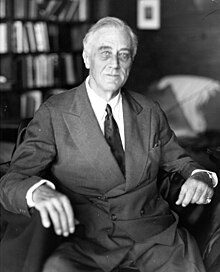Presidency of Franklin D. Roosevelt, third and fourth terms
Roosevelt systematically undercut prominent Democrats who were angling for the nomination, including Vice President John Nance Garner[1] and two cabinet members, Secretary of State Cordell Hull and Postmaster General James Farley.
Willkie's internationalist views initially prevented disputes over foreign policy from dominating the campaign, helping to allow for the Destroyers for Bases Agreement and the establishment of a peacetime draft.
[4] FDR was in a fighting mood, as he called out to an enthusiastic audience in Brooklyn: As the campaign drew to a close, Willkie warned that Roosevelt's re-election would lead to the deployment of American soldiers abroad.
[8] The Democrats retained their congressional majorities, but the conservative coalition largely controlled domestic legislation and remained "leery of presidential extensions of executive power through social programs.
[citation needed] William O. Douglas and Black served until the 1970s and joined or wrote many of the major decisions of the Warren Court, while Jackson and Frankfurter advocated judicial restraint and deference to elected officials.
[26] He stated, "if Great Britain goes down, the Axis Powers will control the continents of Europe, Asia, Africa, Australia, and the high seas—and they will be in a position to bring enormous military and naval resources against this hemisphere.
A key part of this strategy was to ensure that Britain remained in the fight against Germany until the United States, potentially with the aid of other countries, could launch a land offensive into Europe.
Seeking to bolster U.S. power in the Western Hemisphere and eliminate German influence, the Roosevelt administration increased military, commercial, and cultural engagement with Latin America.
[44] Following the attack, Congress amended the Neutrality Act to allow U.S. ships to transport material to Britain, effectively repealing the last provision of the cash and carry policy.
When Japan occupied northern French Indochina in late 1940, Roosevelt authorized increased aid to the Republic of China, a policy that won widespread popular support.
In November, Nomura made a final offer, asking for reopened trade and acceptance of the Japanese campaign in China in return for Japan's pledge not to attack Southeast Asia.
[56] Roosevelt called for war in his famous "Infamy Speech" to Congress, in which he said: "Yesterday, December 7, 1941—a date which will live in infamy—the United States of America was suddenly and deliberately attacked by naval and air forces of the Empire of Japan."
[59] He and his military advisers implemented a Europe-first strategy with the objectives of halting the German advances in the Soviet Union and in North Africa; launching an invasion of western Europe with the aim of crushing Nazi Germany between two fronts; and saving China and defeating Japan.
On the whole the Roosevelt policy in Latin America was a political success, except in Argentina, which tolerated German influence and refused to follow Washington's lead until the war was practically over.
[96] The cracking of the German Enigma code, along with the construction and deployment of American naval escorts and maritime patrol aircraft helped give the Allied Powers the upper hand in the Battle of the Atlantic after 1942.
[99] General Carl Andrew Spaatz redirected U.S. strategic bombing efforts to focus on German aircraft production facilities, and the Allies enjoyed air superiority in Europe after February 1944.
[104] Roosevelt pushed the limits of his executive authority where possible, which allowed for several Austrian and German Jews, including Albert Einstein, to escape from Europe or remain in the United States past their visa expirations.
[107][108] Republican Senator Robert A. Taft stayed quiet on foreign and defense issues, while many of the energetic isolationists of the 1930s, including Hiram Johnson and William Borah, were in poor health or had seen their influence decline.
[114][115] In 1944, Roosevelt requested that Congress enact legislation which would tax all "unreasonable" profits, both corporate and individual, and thereby support his declared need for over $10 billion in revenue for the war and other government measures.
Benefits included a year of unemployment pay at $20 a week, tuition and living expense to attend high school or college, and low-cost loans to buy a home, farm or business.
[121] The U.S. government generally relied on voluntary contracting to mobilize the production of war materials, but in rare cases the Roosevelt administration temporarily took control of industrial facilities.
Congress also created tax incentives designed to encourage the shift to military production, while the Reconstruction Finance Corporation continued to offer loans to help expand industrial capacity.
[130] In August 1939, physicists Leo Szilard and Albert Einstein sent the Einstein–Szilárd letter to Roosevelt, warning of the possibility of a German project to develop an atomic bomb (now called a "nuclear weapon").
Roosevelt and Churchill agreed to jointly pursue the project with the Quebec Agreement allowing American scientists to cooperate with their British counterparts, including at least one spy who provided Moscow with the top secret details.
The cooperation with Darlan allowed the Allies to quickly gain control of much of North Africa, but it also alienated Free French leader Charles de Gaulle and other opponents of the Vichy regime.
Darlan was assassinated in December 1942, while Vichy France broke relations with the United States and requested that German forces prevent the Allies from gaining control of French Tunisia.
[155] The demand for unconditional surrender was calculated to reassure the Soviets, who were still insisting on an immediate attack on German-occupied France, that the United States would not seek a negotiated peace with Germany.
[168] After sweeping across Maritime Southeast Asia in the months following Pearl Harbor, Japan looked to further expand its territory, taking control of the Solomon Islands and parts of New Guinea.
[183] The Big Four of the United States, Britain, Soviet Union and China would make the major decisions, with France added later to provide permanent members of the all-powerful Security Council.
[216] After Roosevelt's death, his widow Eleanor continued to be a forceful presence in U.S. and world politics, serving as delegate to the conference which established the United Nations and championing civil rights and liberalism generally.







